ICWA Weekly News 5-7-25
Last day for GiveBIG; declining interest in taking flu and Covid shots; medical freedom doctors visit Spokane; DOH focuses marketing on elderly; and the vaccine Care-A-Van gets new funding
In this issue:
GiveBIG
Declining Needle Interest in Washington
Dr. McCullough, Scott Atlas and Many Other Docs Speak in Spokane
Washington Department Health Expands Vaccine Marketing Plan to the Elderly
Washington Care-a-Van Is Baaaack
May 2 Episode of Informed Life Radio - - notes and links
Live From Medical Freedom Northwest [54 mins on ICWA] [CHD.TV] [CHD-WA]
Guests: Shawn and Janet Needham, Mary Talley Bowden, Kelly Victory, and Robbie Raugh share summaries of their lessons learned from COVID that they presented in full at the conference.
Health Solutions Podcast with Shawn and Janet Needham
The Raw Truth Recharge: 7 Truths For Total Health and Fitness book on Amazon
Dr. Mary Talley Bowden MD, ENT BreatheMD.org
Dr. Kelly Victory spoke at CHD Washington Chapter kickoff / Vaxxed Bus in Spokane in 2024
GiveBIG
Campaign ends today – thank you for donating.
Git ‘er done readers!
Upcoming Events
Before Friday, May 9: 🔥 Call to Action for Idaho Readers🔥 Please Respectfully Write to Idaho’s Central District Health Board. Citizens and a team of scientists will be asking for a vote on Friday, May 9, 2025, to defund the Covid-19 shots and their promotion.
Wednesday, May 14: Ninth Circuit oral arguments (15 minutes per side) appeal of Stockton v Ferguson on doctors’ free speech. 9:30 am in Courtroom 1, 3rd Floor Room 338, James R. Browning U.S. Courthouse, San Francisco. Livestream the hearing HERE.
Sunday, May 18, 6-8 pm: David Spring of Washington Parents Network speaks at Bethel Community Church on Winning the War Against Families.
Friday, May 23, 6-9 pm: Patriots United final event, Preparing for the Next Plandemic, in Washougal with Robert Scott Bell and Scott Miller, and our newest activist, Battle Ground’s Dr. Joyce Choe. Tickets are only $10.
Saturday, May 24, 9 am - 6 pm: Make your Home Healthy Again. Healing for the A.G.E.S. Virtual Solutions Summit from Drs. Ardis, Group, Ealy, and Schmidt. Use code “ICWA” for 30% off. Nine CEUs available.
Declining Needle Interest in Washington
Last week, Dr. Peter McCullough wrote about the decreasing willingness to take COVID-19, influenza, and respiratory syncytial virus vaccines. In particular, he discussed the following:
With little press, on Friday April 25, 2025, the CDC floated out its survey results on uptake of the recommended respiratory viral vaccines: COVID-19, influenza, and respiratory syncytial virus. As you can see a minority of Americans across the board are interested in taking more shots.
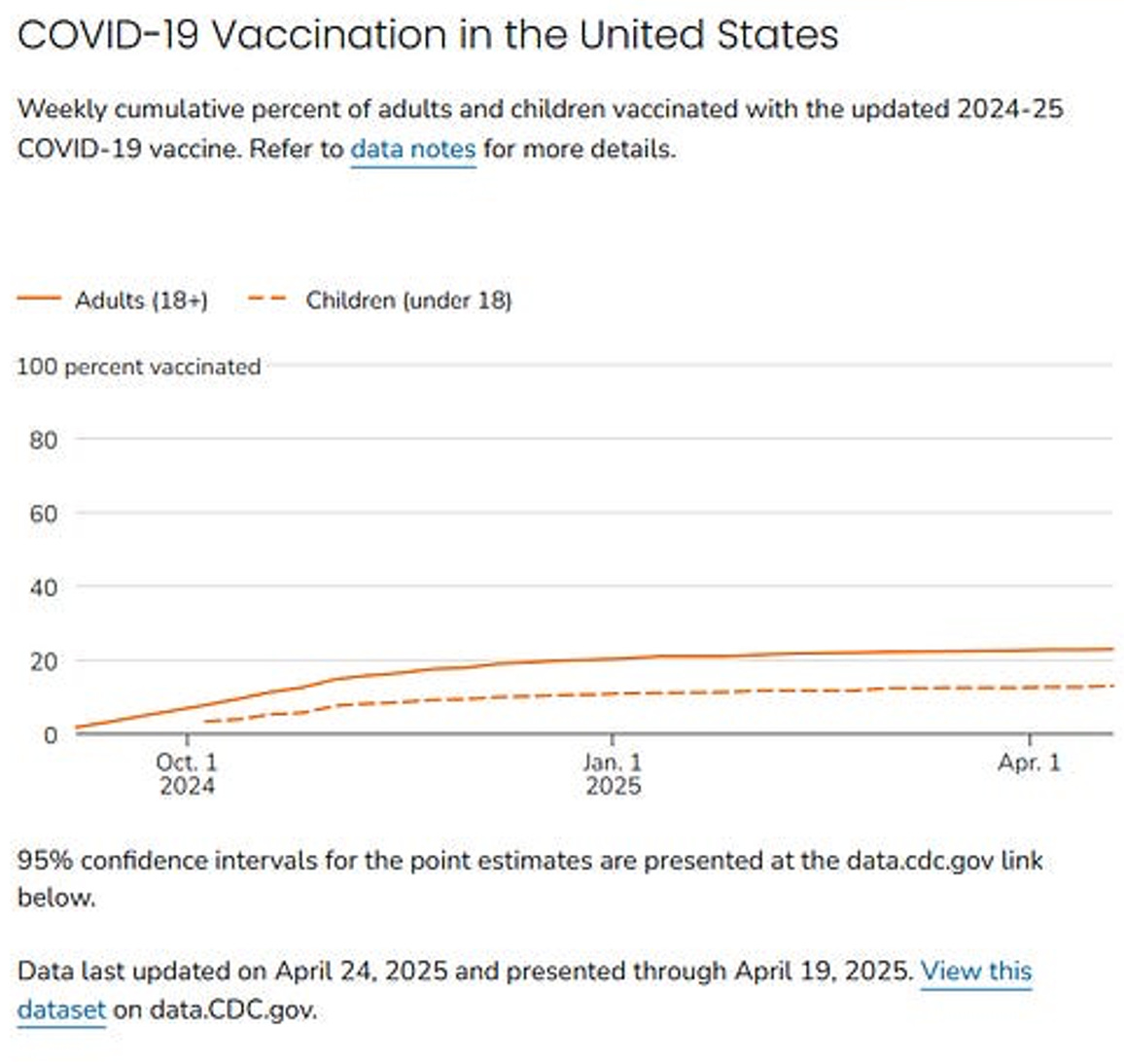
Dr. McCullough added that the CDC does not have vaccine administration data infrastructure to capture the real rate of vaccination in the United States. Rather it relies on survey data. “Keep in mind that responder bias in general tilts the data towards positive responses,” McCullough wrote. “It is possible that the real rates of vaccination are less than half reported.”
So, what accounts for these low uptake levels and declining interest?
“The ongoing COVID-19 vaccine debacle has been devastating to vaccine trust among American families,” Dr. McCullough wrote.
Indeed, the last edition of ICWA Weekly News pointed out that of the 38,541 reports of death following the COVID-19 shots, 8,339 had COVID-19 symptoms post-vaccination or at the time of death. Of the 238 reported deaths following the COVID-19 shots here in Washington, 64 are listed with COVID-19 symptoms after vaccination, and then died. Of those 64, twenty-one of the VAERS reports noted in the submitted write-ups that the patient died of COVID-19.
This decline in trust in the COVID-19 shots is confirmed in the Washington Department of Health’s data dashboard, which shows the COVID-19 shot rate dropping from 70.0 percent for the primary series to 19.8 percent for last season to 18.6 percent for this season.
As for influenza shots, Dr. McCullough noted, “Lackluster estimated vaccine efficacy for this year’s influenza vaccine has worsened public confidence.”
At the April 9 meeting, ICWA Director Bob Runnells made sure the Washington Board of Health was aware of the flagging flu shot effectiveness during his public comments. The influenza vaccine efficacy from Cleveland Clinic study found a 26.9% negative efficacy for the influenza vaccine during the 2024–2025 respiratory viral season.
Negative efficacy for 2024-25 flu shot? Never very efficacious, this season’s shot combination looks to be extremely bad. It’s safe to say something may be terminally wrong with the flu vaccine program.
Quoting Trial Site News, The Defender summarized the results of the study:
People who received a flu vaccine formulated for the 2024-2025 flu season had a 27% higher risk of getting the flu than those who didn’t get the vaccine, suggesting “the vaccine has not been effective in preventing influenza this season,” according to a new preprint study. [emphasis added]
The study of 53,402 employees of the Cleveland Clinic, an Ohio-based nonprofit academic medical center, concluded that the flu vaccine had a negative effectiveness rate of 26.9%.
This “worsened public confidence,” as mentioned above by Dr McCullough is also reflected in the Washington Department of Health data dashboard for flu shots, which shows low overall uptake and mostly reduced uptake as compared to the average of the previous three years.
VAERS reports further calls into question the safety and efficacy of the influenza shots, for 5,176 cases have been reported in the United States where the symptom is influenza following the influenza shots.
And don’t forget the 2011 Harvard Pilgrim Health Care study, which estimated that perhaps only one percent of adverse events from vaccinations are reported to VAERS.
Here in Washington, sixty-eight cases of influenza following the influenza shots have been reported to VAERS.
VAERS takes a while to process, so it’s hard to tell whether any influenza reactions from the vaccines have occurred so far this year. But last year, two influenza reactions occurred.
VAERS ID: 2799467. 78-year-old female in which the onset began on the same day as the vaccination on October 14, 2024. Submitted write-up: Patient felt like she was coming down with the flu and fatigued on 10/15. Patient developed a ovular rash at injection site 3 inches in diameter. Rash is not raised. Does not itch. Site is a little warm and sore. No other issues.
VAERS ID: 2805449. 61-year-old male in which the onset began four days after the vaccination on October 21, 2024. Submitted write-up: Patient stated adverse reactions started four days after receiving injection, patient stated he "got the flu" and is now recovering from having the flu and phlegm.
Dr. McCullough and Scott Atlas speak in Spokane
Speaking of Dr. Peter McCullough (
), he spoke to an audience of health care providers and activists at the Medical Freedom Northwest event in Spokane on May 3. The event was not filmed or recorded so that the healthcare providers could relax and not worry as much about what they had to say, but attendees’ cameras were clicking away to commemorate the moments.



For Drs. Mary Talley Bowden and Kelly Victory, tune in to Friday’s livestreamed Informed Life Radio for a summary of their speeches.
Informed Choice Washington members tabled at the event, displaying our legislative efforts and bills filed, such as SB 5781 and 5783, and educational materials, along with Children’s Health Defense books, flyers and stickers.
Washington Department of Health Expands Its Vaccine Marketing Plan to the Elderly
In his latest book, Vax Facts: What to Consider Before Vaccinating at All Ages & Stages of Life, Dr. Paul Thomas wrote about the staggering increase in vaccines scheduled for children during his career as a pediatrician:
As a pediatrician for 35 years, I witnessed the ever-expanding vaccine schedule. When I was in medical school in the early 1980s, there were just a handful of shots on the schedule. By 2023, with the new addition of COVID and RSV shots, the count had risen to over 40 doses in the first two years of life and more than 70 doses by the time you are 18. That number could rise to close to 100 if the ACIP decides to recommend COVID shots annually. If you look at the schedule, you will not see that many shots. So, let me clarify those numbers. “Polyvalent” shots, ones that contain vaccines for more than one disease, are counted as doses for each of the diseases the shot covers. For instance, the DTaP shot covers diphtheria, tetanus, and pertussis so is counted as three doses just as the MMR, covering measles, mumps and rubella, is three vaccines in one. The trend lately is to pack as many doses as possible into a single shot. That may seem safer because it reduces the total number of shots, but think about what can happen when prescription medications are taken together.
But as if this isn’t enough, last Friday, the Washington Department of Health (DOH) threw out the following headline in its Vaccines for Respiratory Illnesses Newsletter:
Older Americans Month: You Never Outgrow Your Need For Vaccines!
- DOH Vaccine for Respiratory Newsletter, May 2, 2025
While noting that May is “Older Americans Month,” it went on to say, “Vaccines are not just for kids.”
The sales pitch then cut into the following details:
Regardless of age, adults need protection too! Over time, protection from childhood vaccines can wear off leaving adults at risk for diseases. Factors like your age, occupation, travel plans, and medical conditions all have an effect on which vaccinations you need. So be sure to talk to your doctor about what's right for you.
Then again, the DOH couldn’t care less about what your doctor has to say when it comes to the following vaccines:
Still, some vaccines are typically a must. Here's your guide to all the routine shots that keep serious respiratory illnesses at bay, plus a few other important vaccines that help keep older adults healthy as they age. For more information, check out DOH's For Seniors webpage.
Flu vaccine: Get a flu shot every year. Adults 65 and older should make sure they receive a high-dose or adjuvanted version of the shot. These flu vaccines give a stronger immune response than regular flu shots.
COVID-19 vaccine: Get one dose of the updated 2024-2025 COVID-19 vaccine. People who are immunocompromised or 65 years old and older should receive 2 doses of any 2024-2025 COVID-19 vaccine 6 months apart.
RSV vaccine: All adults 75 and older should get one dose. Adults 60 and over may need a single dose of RSV vaccine if they are at increased risk of severe illness, such as those with weakened immune systems, chronic medical conditions, or who live in nursing homes. Note: Not yet published in CDC's MMWR, but ACIP voted in April 2025, to recommend adults 50-59 years of age who are at increased risk of severe RSV disease can get a single dose of RSV vaccine.
Pneumococcal vaccine: Adults 50 years and older should receive PCV15, PCV20, or PCV21. Adults 65 years and older who previously received PCV13 or PPSV23 should talk to their doctor to decide if they should get PCV20 or PCV21.
Tetanus and diphtheria (Td) vaccine or tetanus, diphtheria, and whooping cough vaccine (Tdap): A Td or Tdap booster is needed every 10 years to keep your protection high.
Shingles vaccine: All adults 50 years or older need two doses of the shingles vaccine whether or not they have had shingles or chickenpox, which is caused by the same virus.
The absurdity of this newsletter will hopefully lead some elderly folks to ask questions and take appropriate caution with these artificial attempts at immunity. Certainly they’ve heard stories from their peers who took the shingles or flu shots and then got the very sickness they were to prevent. Leaky vaccine? Breakthrough infection? It’s vaccine failure no matter how the DOH labels it.
Washington Care-a-Van Is Back
In last week’s article by Dr. Peter McCullough, as detailed above, McCullough wrote that the ongoing COVID-19 vaccine debacle has been devastating to vaccine trust among American families. He further noted that lackluster estimated vaccine efficacy for this year’s influenza vaccine has worsened public confidence. He also wrote, “Vaccinologists should take note of these data and find methods to develop safe and far more effective vaccines before they come back to the table and ask for more customers.” [emphasis added]
One would think that the Washington Department of Health would be telling this to the Vaccine Advisory Committee and the Washington Vaccine Association. But what they’re doing instead is instituting more aggressive vaccine marketing by reintroducing the Care-a-Van.
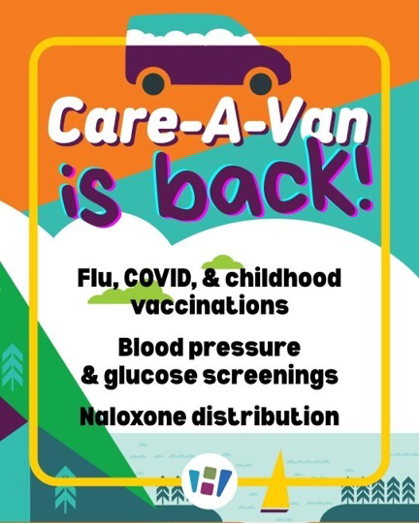
So what is this monster on wheels? The Department of Health had been operating a Care-a-Van since 2021, bringing “equitable access” to underserved communities, albeit with risky, ineffective vaccinations. As we covered last month, the MyNorthwest.com article from June 2, 2021, disturbingly boasted, “Think bookmobile or ice cream truck, but full of Pfizer shots.” Since July 2024, Care-a-Van had administered more than 3,900 flu, 6,800 COVID, and 5,700 childhood shots. Then the DOH Care-a-Van’s tires budget got slashed after being notified of program termination on March 24.
But just last week, the DOH announced, “After securing limited funding, we are pleased to share that Care-A-Van will continue to offer vaccination clinics through June 30, 2025.”
Yesterday, May 6, the Care-a-Van visited the University of Washington Bothell Wellness Fest 2025. Today, May 7, the Care-a-Van is rolling out the jabs at the Washington Department of Health Public Service Recognition Week Enterprise Event in Olympia. On Friday, May 9, the van will be distributing the shots at The Lighthouse Early Learning and Development Center CARES for Auburn.
For the rest of this month, the van will be rolling out the shots at nineteen more events. That adds up to 22 stops over the course of 23 days, including a dual stop in Everett and Yakima on May 14, a triple stop in Coupeville, Prescott, and Woodland on May 17, a dual stop in Elma and Burbank on May 20, a triple stop in Everett, Shoreline, and Cle Elum on May 21, a dual stop in Langley and Tumwater on May 27, and a dual stop in Amanda Park and Seattle on May 29.
Let us know in the comments what song the vaccine truck should be playing as it winds through the neighborhoods.
Editor’s alert: the DOH website may be biased
Not really a meme, but we think the new top banner on all DOH web pages is more evidence of Washington State government bias against our elected leaders: “Please note that some links to federal government websites may be broken due to new presidential executive orders.”
They could have said, “With all the fantastic corrections and updates being made to HHS websites.” It doesn’t get past us that they are shifting blame for HHS-driven changes onto the President.
Please ask the Department of Health what they’ve done lately to help government reform and to correct the errors of their ways.









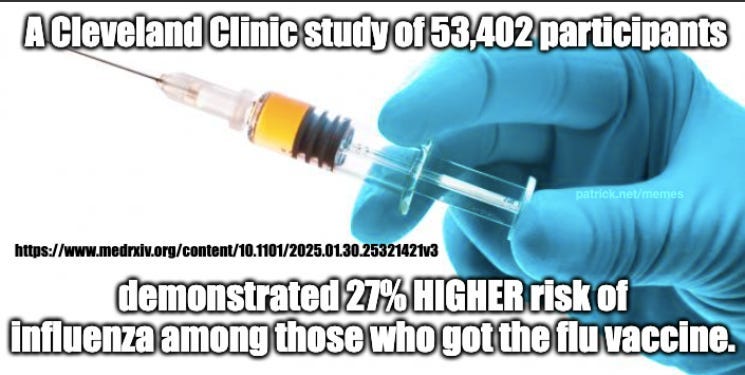
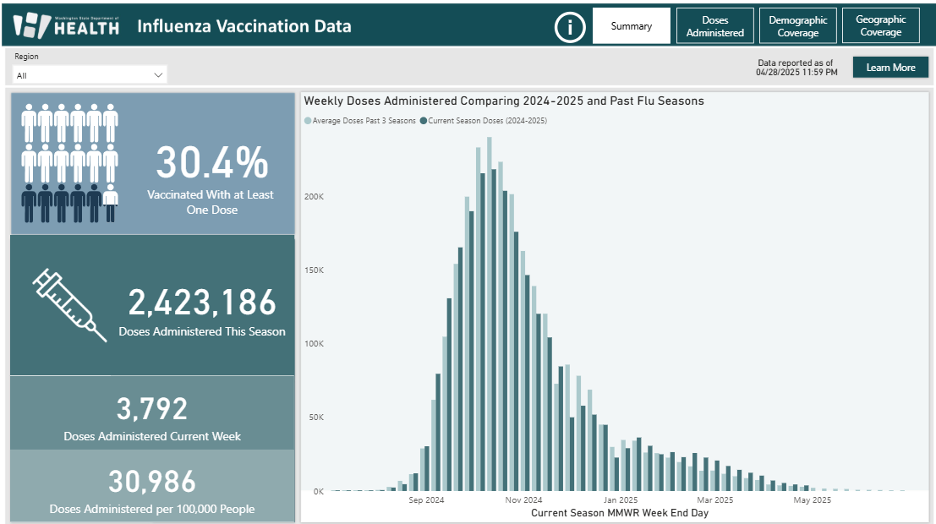

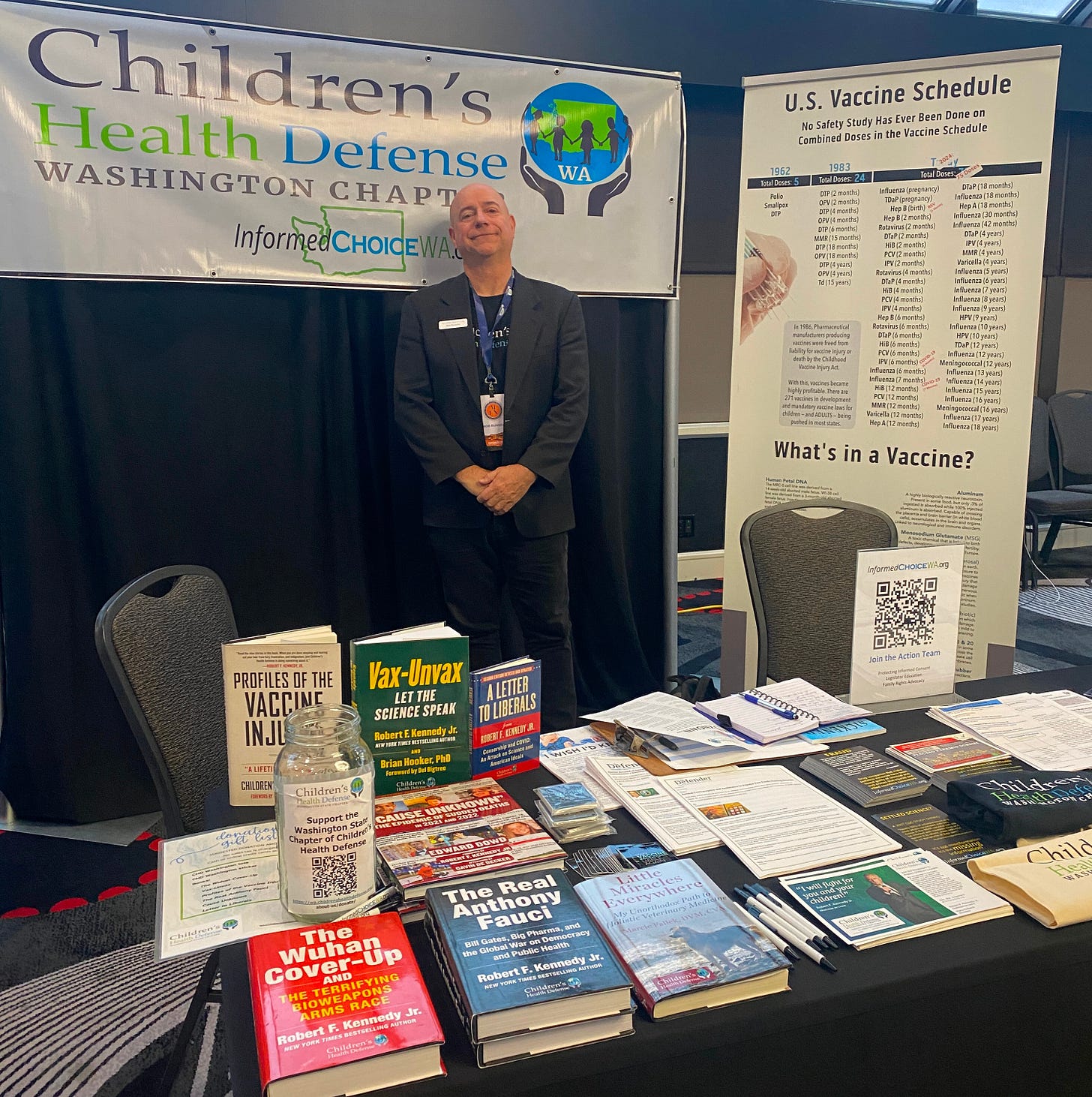

Thank you so much for asking people to write to Central District Health board in Idaho! We greatly appreciate the help of anyone willing to write in. More details here: https://tinyurl.com/23a9aewk
> Let us know in the comments what song the vaccine truck should be playing as it winds through the neighborhoods.
Pretty much anything by Insane Clown Posse.